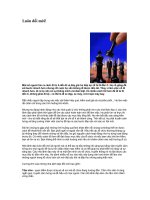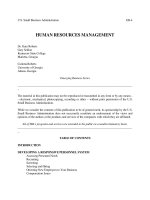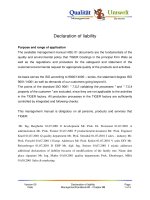Tài liệu Social Media Glossary pptx
Bạn đang xem bản rút gọn của tài liệu. Xem và tải ngay bản đầy đủ của tài liệu tại đây (142.35 KB, 5 trang )
SOCIAL MEDIA TERMS from Livingstonbuzz.com and
/>Adsense: Google's pay-per-click, context-relevant program available to blog and web
publishers as a way to create revenue.
Adwords: The advertiser program that populates the Adsense program. The advertiser pays
Google on a per click basis.
Aggregator – A web application or program that retrieves news (syndication) feeds from
other sources and combines them, potentially sorting them by date, title, author or topic.
AJAX: An acronym (Asynchronous Java Script and XML) representing a way to create real-
time Web applications.
Akismet: Comment spam filter popular with WordPress blogs.
Anonoblog: A blog site authored by a person or persons who don't publish their name.
API: An acronym (Application Programming Interface) representing a computer system or
application allowing for requests to be made of it by other programs and allows for data to be
exchanged. Think "programmable web"
Archives: Most often an index page, often organizing posts or entries by either category or
date.
AstroTurfing: A fake grass roots push to generate buzz or interest in a product, service, or
idea. Often this movement is motivated by a fee or gift to the writer of a post or comment or
may be written under a phony pseudonym.
Atom: A popular feed format used for syndicating content.
Atom Feed – A syndication feed format first proposed by Sam Ruby in 2003. It was
designed to work better with XML-structured content as well as HTML or text content, and
includes category, publication and summary information.
1
Atom Publication Protocol (AtomPub) – A set of standards that define how Atom feeds
can be used to publish blog content and similar data to the Web, although it is also being
used increasingly to build applications that treat the Web like a database.
Avatar: A graphical image or likeness that replaces a photo of the author of the content on
a blog.
Badge – An image, usually squared and displayed on a blog, which signifies the blogger’s
participation in an event, contest, or social movement.
Blog (Short for Weblog)
An article published via either a content management system or through an application to a
specialized Web server to appear on the Internet. Blogs cover myriad topics, from political
commentary to technical discussions to personal journals and even weather reports. The
term blog also refers to a collection of such articles available from a given "blog site."
Blog Post/Entry: Content published on a blog. Entries may include pictures or embedded
videos and links URLs for online sources used.
Blogroll: An assembly of blog URLs – blogs that the blogger reads regularly – displayed at
the sidebar of the blog
Blogs: A website where individual(s) provide entries of any type of content from video and
podcasts to traditional text and photos in order to inform or create discussions; presented in
reverse chronological order
Blogosphere: The collection of all of the blogs currently published on the Web, along with
the infrastructure that publishes them. According to Blogscope, there are currently 30
million blogs with 140 million posts on the Web, as of October 2008.
Boardreader: An aggregator of message boards and forum discussions
Buddy List: A collection of friends and contacts names and Web links that are usually
stored on a central database on the Web. While initially developed for Instant Messaging
services, buddy lists have become an integral feature of most social networking services.
Comments: Replies or opinions in reference to the topic at hand; usually left on blog posts
Compete: Provides web analytics (i.e. unique monthly visitors to the site) and enables
people to compare and contrast up to 5 different sites at a time
“Do-good” networks: Online communities aimed at making the world a better place
Drupal: An open-source community management system, built around the use of news
(syndication) feeds and user-based code, that is becoming one of the most popular tools for
2
creating community and social networking sites. Drupal modules provide extensive
additional functionality that make it possible to use Drupal for everything from political
sites to newspaper front-ends to airline reservation systems.
Flickr: The largest photography social networking site on in the Internet. Flickr has more
than 2 billion photographs online, with 3 million to 5 million new photographs added daily.
Vancouver-based Ludicorp started the service in 2004, and Yahoo! acquired it in 2005.
Groundswell: A social trend in which people use technologies to get the things they need
from each other, rather than from traditional institutions like corporations. (Charlene Li and
Josh Bernoff, Groundswell, pg. 9)
Hyper-local community: A group of people from a specific location who interact in
online communities and use social media tools
Influencer: A person specialized in a specific subject matter and highly recognized in an
online community that has the ability to sway others’ thoughts; key influencers are seen as
references or for assistance on specific subject matters
Instant Messaging
Any system that allows instantaneous person-to-person conversations over a network, and
has its root in 1960s early Unix chat systems. While most instant-messaging systems have,
in the past, been formed across proprietary networks, many IM conversations today take
place using the open XMMP/Jabber protocol and can take place between different
commercial networks.
Jabber
An open-source instant messaging application, using the open XMMP protocol to allow
communication between two or mare participants. The Jabber commercial organization was
recently acquired by Cisco Systems.
One of the first business-oriented social networking companies, founded in 2002 and
currently supporting more than 24 million registered users across 150 industries. LinkedIn
takes advantage of the "six degrees of separation" concept first proposed by Stanley
Milgram in the 1960s, such that any given user is at most just six personal connections
away from any other business person.
Message Boards/Forums – An online discussion site; people looking to discuss particular
issues or needing support post threads (a message) on the forum or message board in hopes
to gain more information or start a conversation
Micro-blogging – A form of blogging where the entries/posts are limited to a certain
amount of characters or words, i.e. Twitter.
Micro-philanthropy – Donating in small amounts ($1, $5, $10, $20)
3
Multimedia – Media and content in different forms such as videos, pictures, etc. Examples
include YouTube and Flickr
Online community – a group of people using social media tools and sites on the Internet
Platform – the framework or system within which tools work; That platform may be as
broad as mobile telephony, or as narrow as a piece of software that has different modules
like blogs, forums, and wikis in a suite of tools. As more and more tools operate “out
there” on the web, rather than on your desktop, people refer to “the Internet as the
platform”. That has advantages, but presents challenges in learning lots of different tools,
and getting them to join up. (socialmedia, A-Z of social media)
Podcasts – Online audio or visual recordings syndicated on the Internet and available to
download to portable media players such as an iPod
Quantcast – Used to measure the amount of traffic a URL receives, as well as data about
the readership (demographics, psychographics, etc.)
RSS Feed – Really Simple Syndication; a system that generates frequently updated
information from a site (i.e. blog posts, online articles)
• Reader – Aggregates information from RSS Feed into one site
Search Engine Marketing (SEM) - Is a form of Internet marketing that seeks to promote
websites by increasing their visibility in search engine result pages (SERPs). According to
the Search Engine Marketing Professional Organization, SEM methods include: search
engine optimization (or SEO), paid placement, contextual advertising, and paid inclusion
(Wikipedia, Search Engine Marketing)
Search Engine Optimization (SEO) – Is the process of improving the volume and quality
of traffic to a web site from search engines via “natural” (”organic” or “algorithmic”)
search results. (Wikipedia, Search Engine Optimization)
Sentiment – A level of assessment that determines the tone of an article, blog post, a
company, etc.; usually positive, negative, or neutral
Social Bookmarking – A method for people to search, organize, store and share items (i.e.
blog posts, online articles, pictures, etc.) of interest using the item’s URL
Social Media – A term used to describe tools and platforms people use to produce, publish
and share online content and to interact with one another. Social media tools include blogs,
podcasts, videos, microblogs, wikis, etc.
Social Networking Sites – Large sites that host multiple communities comprised of people
with profiles who have with similar interests. These sites offer a place where people engage
with one another online and share content. Example communities include:
4
• Facebook – An online community for people to connect or re-connect with others.
Enables people to share videos, pictures and information about themselves. One of
the fastest growing social networks of the past two years.
• LinkedIn – A professional online community used to network with fellow
professionals; an online resume sharing site
• MySpace – A site where people can meet others with similar interests, creating
online communities by sharing videos, photos, and personal information
• Friendfeed – enables you to keep up-to-date on the web pages, photos, videos and
music that your friends and family are sharing. It offers a unique way to discover
and discuss information among friends (FriendFeed About Section)
• YouTube – An online site for uploading and discussing videos; Videos can also be
embedded from YouTube onto other social media sites such as blogs or social
networks
• Flickr –Online site for storing, sharing and commenting on photos
• Twitter – A micro-blogging community where posts and links are 140 characters
or less
o Tweet – The post/entry made on Twitter
o Hashtag – Similar to regular tags, these are keywords associated and
assigned to an item of content with a hash mark (#) attached to the front of
the word. Hashtags make it easier to follow a topic of interest discussed on
o Twitter Search – A search engine that filters out real-time tweets
Tags – a keyword or term associated and assigned to an item of content (i.e. blog post,
video, photo, etc.). Usually added to an item of content to enhance search engine
optimization and make it content easier to organize and find
Technorati Authority – Used to determine the number of times a keyword or URL are
mentioned and linked in blogs
Webinar – An online seminar
Web 2.0 – Is the business revolution in the computer industry caused by the move to the
Internet as a platform, and an attempt to understand the rules for success on that new
platform – Tim O’Reilly
Widget – A mini application that performs a specific function and connects to the Internet
Wiki –Webpage(s) used to collect content about a topic. Anyone with access to the page(s)
can edit or modify the information. See Wikipedia.
5









